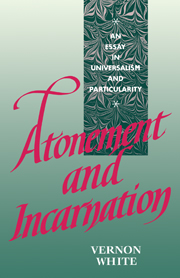Book contents
- Frontmatter
- Contents
- Introduction
- 1 The claim
- 2 On having lived too long and seen too much
- 3 The work of Christ (On trying to conceive how ‘things are not as they were’)
- 4 Two recent contributions
- 5 Creating an atonement model
- 6 The person of Christ (On trying to conceive how the Word became Flesh)
- 7 A moral demand: conditions for real reconciliation
- 8 Anthropocentricity, imperialism, and evangelism: an ethical postscript
- Notes
- Bibliography
- Index
- Frontmatter
- Contents
- Introduction
- 1 The claim
- 2 On having lived too long and seen too much
- 3 The work of Christ (On trying to conceive how ‘things are not as they were’)
- 4 Two recent contributions
- 5 Creating an atonement model
- 6 The person of Christ (On trying to conceive how the Word became Flesh)
- 7 A moral demand: conditions for real reconciliation
- 8 Anthropocentricity, imperialism, and evangelism: an ethical postscript
- Notes
- Bibliography
- Index
Summary
The traditional claim, that the particularity of the Christ event is constitutive of universal reconciliation, has been made consistently in theological history, and it is well worth noting how it is located at some key points in the tradition. This fact that, hitherto, the claim has been maintained through a developing tradition and through different intellectual and social contexts, is not much disputed. But a brief survey of some of its clearest expositors is still offered here, simply to put down a marker. Although rudimentary it will help guard against any temptation to minimize the weight of tradition behind the claim, either by ignoring it or by some sort of veiled hermeneutical attack (‘it never really meant that’).
To begin with this means noting its origin, in its clearest and most insistent expression, in the Pauline literature of the New Testament. As our introductory comments have made clear it will obviously not be sufficient merely to repeat a Biblical claim in order to settle the matter. Nevertheless, we can only start there, whatever constraints a ‘small world’ view may have imposed upon it. For there is no doubt that the New Testament, and St Paul in particular, came to see reconciliation through Christ as a divine work on the widest possible scale.
- Type
- Chapter
- Information
- Atonement and IncarnationAn Essay in Universalism and Particularity, pp. 8 - 14Publisher: Cambridge University PressPrint publication year: 1991

